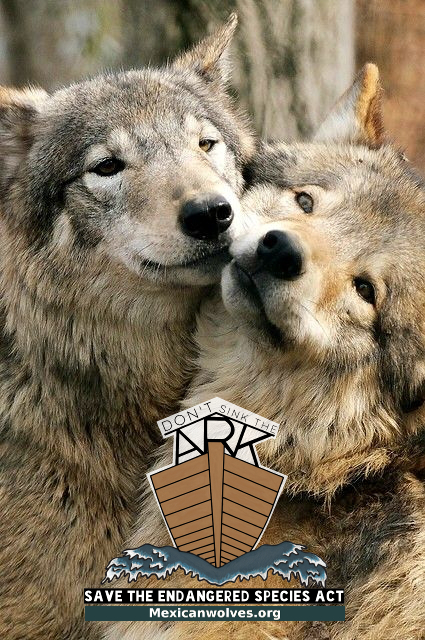ACTION ALERT! Defend the Endangered Species Act
 The Endangered Species Act allows members of the public to petition the U.S. Fish and Wildlife Service (the Service) to list a species as threatened or endangered. Once listed, the Service is then required to develop a recovery plan to prevent the species from going extinct, starting with designating its critical habitat, when the public again has an opportunity to get involved by providing critical information.
The Endangered Species Act allows members of the public to petition the U.S. Fish and Wildlife Service (the Service) to list a species as threatened or endangered. Once listed, the Service is then required to develop a recovery plan to prevent the species from going extinct, starting with designating its critical habitat, when the public again has an opportunity to get involved by providing critical information.
Now the Service wants to unfairly change the rules in ways that will make it nearly impossible for all but the largest conservation organizations to participate in these processes, as well as give state wildlife agencies unprecedented power to hamper petitioning efforts it doesn’t like (e.g., for the sage grouse).
Please submit your comments on or before 11:59 p.m. EDT, September 18, 2015 either electronically or by mail:
Electronically: You may submit a comment by clicking on “Comment Now!”
http://www.regulations.gov/#!documentDetail;D=FWS-HQ-ES-2015-0016-0030
U.S. mail:
Public Comments Processing
Attn: Docket No. FWS-HQ-ES-2015-0016-0030
U.S. Fish and Wildlife Service, MS: BPHC
5275 Leesburg Pike
Falls Church, VA 22041-3803.
KEY POINTS
The Service’s proposed changes to Endangered Species Act (ESA) place an unfair and almost impossible burden on the public — usually private citizens and small conservation organizations — trying to petition under the ESA. Public petitioners would have to:
- Notify up to 50 state wildlife agencies before they could even file a petition with USFWS.
- Certify that they have looked on state websites and included all negative information and comments from wildlife agencies in each state where the species is found — before the USFWS would even look at their petition.
- Submit separate petitions for each species — even if much of the significant information supporting the petition applies to dozens of species at risk from the same conditions.
- Submit extensive — often difficult and expensive — information in each of four distinct areas, or else the Service would reject the petition without even looking further at the petition.
TELL THE SERVICE:
- The right to petition the government is guaranteed by the First Amendment to the Constitution. Their proposed change to the ESA petition process unfairly increases the burden on the public.
- Petitioners should be permitted to include more than one species in a petition where there is substantial commonality in the data and reasons supporting the petition.
- Petitioners should not have to seek comments and data from multiple states at least thirty days before simply filing a petition asking the Service to make an initial decision whether action on the petition even might be warranted.
- Petitioners should not have to certify that they have attached to their petition all negative information on multiple state websites and/or provided by the states. State agencies already have multiple opportunities to comment at different stages of the petition process.
- While the Service should encourage comprehensive and detailed information in petitions, it should evaluate every petition on the totality of the circumstances — and not automatically reject a petition if it does not include information in each of the four categories specified by the Service.
 MORE DETAILED TALKING POINTS
MORE DETAILED TALKING POINTS
- Violates presidential Executive Order 13563 by reducing the burden of federal regulations on federal bureaucracies and state wildlife agencies while increasing the burden on the public trying to file a petition.
- Increases burden on the public (petitioners) by limiting petitions to only one species per petition.
- Requires the public to submit petitions to the wildlife management agency in every state where the species “occurs” before being allowed to even submit the petition to the U.S. Fish & Wildlife Service.
- Requires the public submitting a petition to include whatever incomplete, inaccurate, or biased data or comments the state agencies may make about that petition.
- Requires petitioners to do their opponents work for them by submitting information which undercuts the petition and may be useful to the service in making a negative finding.
- Imposes expensive pre-petition burden on the public by mandating petitions contain “adequate” information — strait- jacketed into four specific categories often requiring detailed and expensive research — or face rejection as not presenting “substantial information” that the petitioned action even may be warranted.
- Enables state wildlife agencies to force delays longer than the current 90-day deadline for U.S. Fish & Wildlife Service to decide whether a petitioned action may be warranted.
- Thirty (30) days before being allowed to even file a petition to USFWS, the member of the public would have to give copies to every state’s wildlife management agency where the species “occurs.”
- The state(s) could — but would not be required to — provide the petitioner with data or comments about the completeness and accuracy of the petition.
- The states could wait to provide data and comments until after the petition is filed.
- State data received after the filing of the petition would not “reset the [90-day] clock for the Services’ consideration of the petition” — but would become part of the data that the Services would be allowed to consider.
- If the petitioner supplemented the petition to respond to the states’ comments, that would “reset the clock” and give the U.S. Fish and Wildlife Service another full 90 days before being required to make a finding (decision) on the petition.
- Thus, under the proposed changes to the regulation, state wildlife agencies could force the petitioner to choose between either dragging out the time for an initial (90-day) finding by resetting the clock for USFWS or permitting USFWS to make its decision based on uncontradicted data and comments –regardless of completeness or accuracy — submitted by the state(s).
Redefines the Endangered Species Act’s definition of “substantial information” to raise the bar for initial petitions and largely insulate the Service’s refusal to reconsider its previous decisions.
- Currently, a petitioner must support the requested action with “substantial scientific or commercial information” — defined as “that amount of information that would lead a reasonable person to believe that the measure proposed in the petition may be warranted.”
- The proposed regulation would impose an additional requirement before the Service makes a preliminary (90-day) finding that the action even may be warranted: “substantial scientific or commercial information” refers to “credible scientific or commercial information in support of the petition’s claims such that a reasonable person conducting an impartial scientific review would conclude that the action proposed in the petition may be warranted.”
- The current regulation adopts a single definition of “substantial scientific or commercial information,” regardless of the stage in the petition process.
- The proposed regulation redefines that phrase to say that once the Service has made a negative decision, it never needs to reconsider that decision — unless the petitioner comes forward with compelling additional information or analysis not previously presented to the Service.



